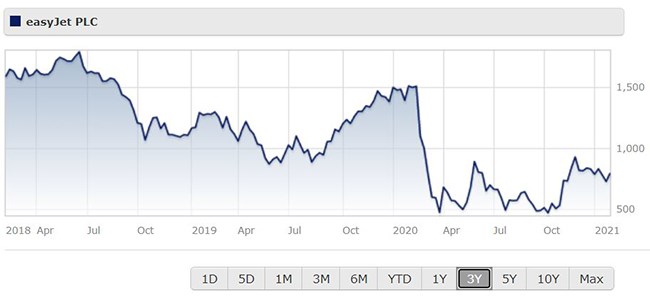
Our stock of the week has a travel theme and our Twitter followers have chosen easyJet (EZJ), Europe’s second largest airline behind Ryanair (RYA). For most airlines, 2020 was one of the toughest trading periods in their history: easyJet passenger numbers fell 87% to 2 million in the last three months of 2020 and passenger revenue dropped by 90% (to £118 million).
And in its annual results in November last year, the airline said its passenger numbers had halved in the year to the end of September, from just under 100 million in 2019 to 48 million in 2020. As a result, the airline made a £1.2 billion loss for the year, compared with a profit of £430 million in 2019. (For comparison, former stock of the week IAG lost over £5 billion during nine months in 2020).

This graph illustrates the immediate impact of the pandemic, with the company’s shares falling 66% from £15 to £5 in a matter of weeks. The price started to recover back towards £10 as many of easyJet’s key Europe routes started to re-open in the summer, but this activity waned sharply in the autumn as Covid-19 cases started to rise again. Shares then spiked again as the vaccine breakthrough pushed up stocks most sensitive to consumer behaviour, such as airlines, hotels and cruise companies. A loan guarantee backed by UK Government has helped reassure shareholders too.
For investors, how much cash airlines have and how fast it is being spent have become key metrics: easyJet says it has a £2.5 billion, including loans and credit with banks, and is spending £160 million a month. Morningstar analyst Joachim Kotze is upbeat that the company has enough resources to see it through the year with “ample liquidity even in the event of a prolonged recovery”. Despite the uncertainty over lockdowns and the vaccine rollout, easyJet’s cost-cutting “could see it emerge from the crisis in a strong position with higher profitability”.
Indeed, despite the uncertainty over the end of lockdown measures and the speed of the vaccine rollout across Europe, Kotze says that easyJet is best placed among European airlines covered by Morningstar to take advantage of the recovery when it comes. He says the shares at around £8 are currently around 30% below their fair value.
Dividends and Carbon Emissions
Income-wise, easyJet scrapped its dividend for the last financial year (in line with many other consumer-focused companies), having paid out 43.9 p per share the previous year; that would have yielded over 5% at the current share price.
The airline has also signed a five-year loan agreement with a syndicate of banks and part guaranteed by the UK Government. While this isn’t the “bailout” that some airlines wanted at the start of the pandemic, easyJet says the loan has significantly strengthened its balance sheet. As with other state aid programmes, there are some restrictions about dividend payments – but the airline says these still allow it to pay dividends in future.
The pushback against carbon-intensive travelling was already building before the pandemic, with “flight shaming” gaining ground among some more environmentally minded consumers. While many people will be desperate to jump back on a plane as soon as they are vaccinated (and resorts re-open), there are others who will use coronavirus as an opportunity to rethink their previous lifestyle. Morningstar-owned ratings agency Sustainalytics ranks easyJet as “high” risk from an ESG perspective , one rung below the “Severe” category. Still, analysts support the airline’s attempts to reduce carbon emissions: “We identify the company’s efforts to reduce its carbon emissions as positive, given that it achieved a 32.5% reduction in 2018 … and that it announced its goal to become carbon-neutral by 2050 through an extensive offsetting plan, fleet renewal, and other initiatives.”



























